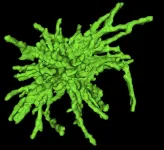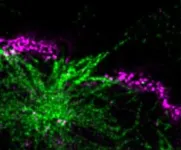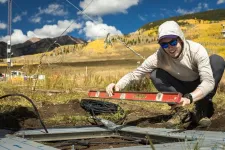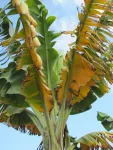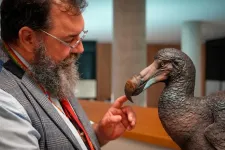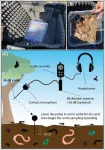(Press-News.org) Researchers at Utrecht University in the Netherlands have identified a new way in which the toxic protein aggregates associated with Huntington’s disease may damage nerve cells and cause them to die. The study, to be published August 16 in the Journal of Cell Biology (JCB), suggests that the aggregates can poke holes in the membrane that separates the nucleus from the rest of the cell, damaging the DNA inside the nucleus and changing the activity of neuronal genes.
Huntington’s disease is a devastating neurogenerative disorder caused by a mutation in the HTT gene that results in cells producing abnormally large versions of the huntingtin protein. These expanded huntingtin proteins aggregate inside cells and damage them in various ways, although exactly how this results in the death of nerve cells remains uncertain.
Spearheaded by graduate student Giel Korsten from the group of Lukas Kapitein, the researchers discovered a major new way in which huntingtin aggregates damage cells when they examined neurons expressing the expanded version of the protein. The researchers found that many of the nerve cells had breaks in the membrane that separates the nucleus from the rest of the cell. This barrier, known as the nuclear envelope, protects and regulates the chromosomes inside the nucleus, allowing them to turn genes on and off as needed.
Kapitein and colleagues found that huntingtin aggregates inside the nucleus disrupt the protein meshwork that underlies and strengthens the nuclear envelope, making the membrane more likely to rupture. Using a specialized technique known as expansion microscopy to visualize the nuclear aggregates in high detail, the researchers saw that tiny fibrils stick out from the aggregates and poke through the meshwork underlying the nuclear envelope. The aggregates may also impair the cell’s ability to reseal the envelope once it breaks, the researchers found.
“We have discovered that the aggregates associated with Huntington’s disease induce ruptures in the nuclear envelope that compromise its barrier function,” Kapitein says.
Over time, these disruptions in the nuclear envelope likely lead to damage of the nerve cell’s DNA and the misregulation of neuronal genes, cellular defects that have previously been linked to Huntington’s disease pathology.
Kapitein notes that several other neurogenerative diseases, including certain types of amyotrophic lateral sclerosis and frontotemporal dementia, are associated with the formation of protein aggregates inside the cell nucleus. “We speculate that nuclear aggregate–induced ruptures in the nuclear envelope represent a common contributor to neurodegeneration that initiates a cascade of deregulated processes culminating in neuronal death and neuroinflammation,” Kapitein says.
Korsten et al., 2024. J. Cell Biol. https://rupress.org/jcb/article-lookup/doi/10.1083/jcb.202307142?PR
# # #
About Journal of Cell Biology
Journal of Cell Biology (JCB) publishes peer-reviewed research in any area of basic cell biology as well as applied cellular advances in fields such as immunology, neurobiology, metabolism, microbiology, developmental biology, and plant biology. All editorial decisions on research manuscripts are made through collaborative consultation between professional editors with scientific training and academic editors who are active in the field. Established in 1955, JCB is published by Rockefeller University Press, a department of The Rockefeller University in New York. For more information, visit jcb.org.
Visit our Newsroom, and sign up for a weekly preview of articles to be published. Embargoed media alerts are for journalists only.
Follow JCB on Twitter at @JCellBiol and @RockUPress.
END
Exploring Huntington’s disease, researchers discover that protein aggregates poke holes in nuclear membrane
2024-08-16
ELSE PRESS RELEASES FROM THIS DATE:
Why isn't Colorado's snowpack ending up in the Colorado River? New research suggests the problem might be the lack of spring rainfall
2024-08-16
The Colorado River and its tributaries provide water for hydropower, irrigation and drinking water in seven U.S. states and Mexico. Much of this water comes from the snowpack that builds up over the winter and then melts each spring. Every year in early April, water managers use the snowpack to predict how much water will be available for the upcoming year.
But since 2000, these predictions have been incorrect, with the actual streamflow being consistently lower than the predicted streamflow. That’s left water managers ...
New research shows unprecedented atmospheric changes during May's geomagnetic superstorm
2024-08-16
On May 11, a gorgeous aurora surprised stargazers across the southern United States. That same weekend, a tractor guided by GPS missed its mark.
What do the visibility of the northern lights have in common with compromised farming equipment in the Midwest?
A uniquely powerful geomagnetic storm, according to two newly published papers co-authored by Virginia Tech's Scott England.
“The northern lights are caused by energetic, charged particles hitting our upper atmosphere, which are impacted by numerous factors in space, including the sun,” said England, associate professor in the Kevin T. Crofton Department of Aerospace and Ocean Engineering. “During ...
How some states help residents avoid costly debt during hard times
2024-08-16
COLUMBUS, Ohio – A new national study provides the best evidence to date that generous unemployment insurance benefits during the COVID-19 pandemic helped reduce reliance on high-cost credit use.
Researchers found that lower-income residents of states with more generous benefits were significantly less likely than those living in less-generous states to take out new credit cards, personal finance loans and payday loans or other alternative financial service offerings.
The study, published recently in the journal ...
Same person. Different place. Twice the odds of a dementia diagnosis.
2024-08-16
With new medications on the market or in the works for Alzheimer’s disease and other kinds of dementia, a new study suggests that getting the diagnosis needed to access these new treatments may depend on where you live.
The percentage of people who get a new dementia diagnosis each year varies a lot across regions of the U.S., the study finds.
And the differences between regions of the country are even larger for people on the young end of the dementia-risk age range, ages 66 to 74, and for those who are Black ...
The banana apocalypse is near, but UMass Amherst biologists might have found a key to their survival
2024-08-16
August 16, 2024
The Banana Apocalypse is Near, but UMass Amherst Biologists Might Have Found a Key to Their Survival
Discovery of molecular mechanisms used by the banana-destroying microbe brings hope to the breakfast table
AMHERST, Mass. – The bananas in your supermarket and that you eat for breakfast are facing functional extinction due to the disease Fusarium wilt of banana (FWB) caused by a fungal pathogen called Fusarium oxysporum f.sp. cubense (Foc) tropical race 4 (TR4). However, thanks to recent research from an ...
Rethinking the dodo
2024-08-16
Rethinking the Dodo
Review of 400 years of scientific literature corrects the record on icon of extinction
Researchers are setting out to challenge our misconceptions about the Dodo, one of the most well-known but poorly understood species of bird.
In a paper published today [16 August 2024] in the Zoological Journal of the Linnean Society researchers from the University of Southampton, Natural History Museum (NHM) and Oxford University Museum of Natural History have undertaken the most comprehensive review of the taxonomy of the Dodo and its closest relative, the Rodriguez ...
Arts and crafts improves your mental health as much as having a job, scientists find
2024-08-16
Could arts and crafts help protect the public’s mental health? A new study in Frontiers in Public Health provides evidence that indulging our creative side could provide everyone with a significant wellbeing boost. Because arts and crafts are relatively affordable and accessible, promoting the public’s access to artistic activities could provide a major boost to public mental health.
“Crafting and other artistic activities showed a meaningful effect in predicting people’s ...
It’s a rave – underground acoustics amplify soil health
2024-08-16
Barely audible to human ears, healthy soils produce a cacophony of sounds in many forms – a bit like an underground rave concert of bubble pops and clicks.
Special recordings made by Flinders University ecologists in Australia show this chaotic mixture of soundscapes can be a measure of the diversity of tiny living animals in the soil, which create sounds as they move and interact with their environment.
With 75% of the world’s soils degraded, the future of the teeming community of living species that live underground face a dire future without restoration, says microbial ecologist Dr Jake Robinson, from the Frontiers ...
New poll finds 50% of parents believe too much time on technology hinders kids from forming connections in the classroom
2024-08-16
COLUMBUS, Ohio (August 16, 2024) – Building positive connections with teachers and peers in the classroom can be critical to the mental health and academic success of children and adolescents. Yet, a new national poll from The Kids Mental Health Foundation, conducted by Ipsos, finds half of parents believe spending too much time on technology and social media hinder children from making meaningful connections as they head into the upcoming school year.
The poll, conducted by Ipsos on behalf of ...
How policing impacts the homeless
2024-08-16
People who are homeless often endure constant and intrusive police interactions, leaving them feeling intimidated, harassed and stigmatised, a new study finds.
More people of all ages and backgrounds are finding themselves homeless, often due to job loss or illness, as well as a lack of affordable housing. Between 2016 and 2021 homelessness increased by 5.2% in Australia.
Professor of Law Thalia Anthony from the University of Technology Sydney (UTS) said the research aimed to give a voice to people experiencing homelessness ...
